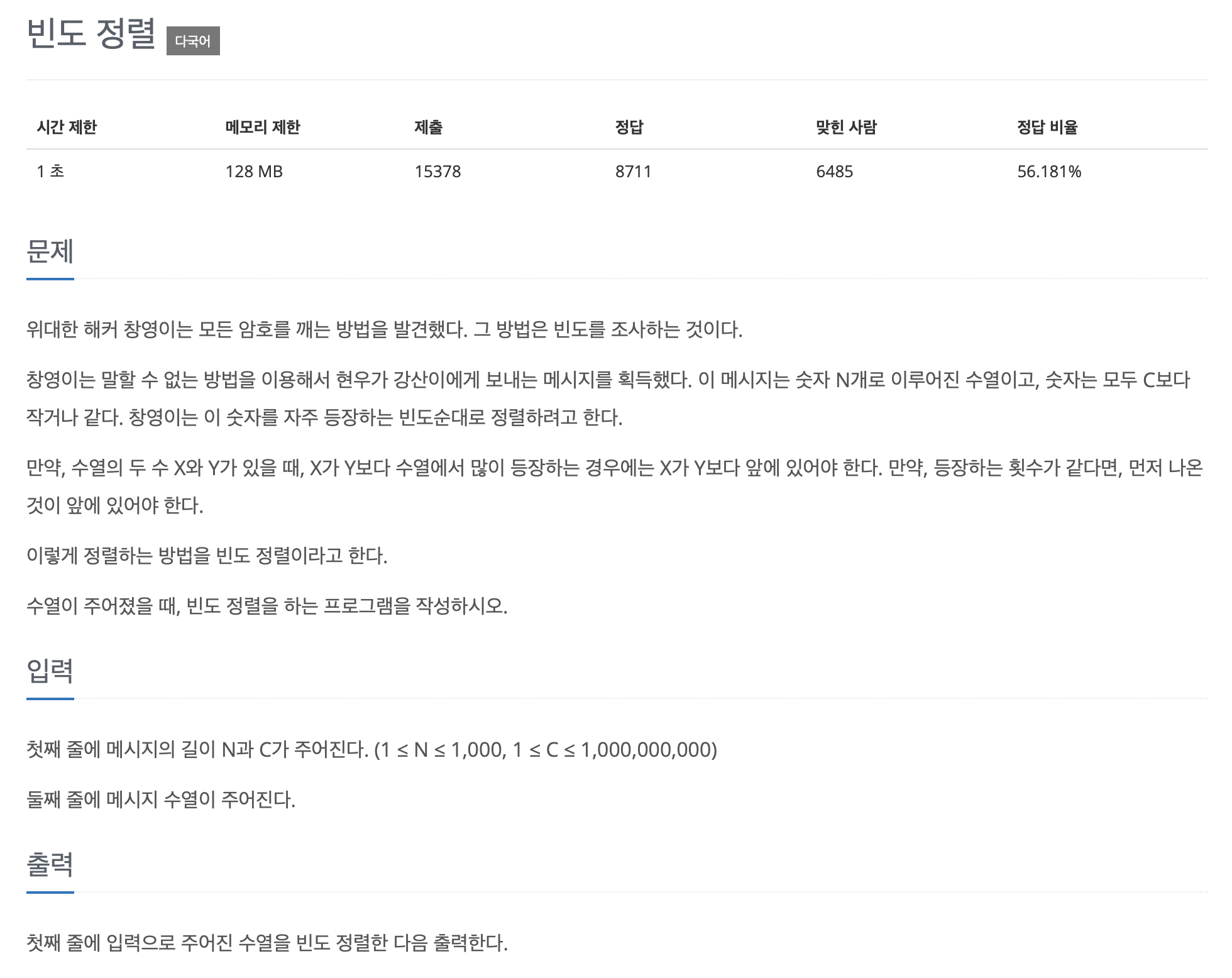[Baekjoon] 백준 2910 빈도 정렬
문제

자주 등장하는 숫자 기준으로 오름차순 정렬하되, 등장횟수가 같다면 먼저 나온 것이 앞에 있어야 한다.
풀이
정렬 관련 함수
// 배열
var numbers = [5, 2, 8, 1, 3]
// 오름차순 정렬
let ascending = numbers.sorted()
print("오름차순:", ascending) // [1, 2, 3, 5, 8]
// 내림차순 정렬
let descending = numbers.sorted(by: >)
print("내림차순:", descending) // [8, 5, 3, 2, 1]
// 딕셔너리
let scores = ["Alice": 88, "Bob": 95, "Charlie": 72]
// 🔹 value 기준 오름차순 정렬
let byScoreAsc = scores.sorted { $0.value < $1.value }
print("점수 오름차순:", byScoreAsc)
// 🔹 value 기준 내림차순 정렬
let byScoreDesc = scores.sorted { $0.value > $1.value }
print("점수 내림차순:", byScoreDesc)
// 🔹 key 기준 오름차순 정렬
let byNameAsc = scores.sorted { $0.key < $1.key }
print("이름 오름차순:", byNameAsc)
// 우선순위 기반 정렬 1
let dic = [1: 2, 2: 5, 3: 5, 4: 1]
let order = [2, 3, 1, 4] // 우선순위: 2 > 3 > 1 > 4
let sortedKeys = dic.sorted {
if $0.value == $1.value {
// O(n)
return order.firstIndex(of: $0.key)! < order.firstIndex(of: $1.key)! // <: 인덱스가 낮은 key가 먼저 온다
}
return $0.value > $1.value
}.map { $0.key }
print(sortedKeys)
// 우선순위 기반 정렬 2
let dic = [1: 2, 2: 5, 3: 5, 4: 1] // num: count
let order = [2, 3, 1, 4]
// [2: 0, 3: 1, 1: 2, 4: 3] = num: idx(Order)
// 우선순위 인덱스를 미리 딕셔너리로 만들어 둔다 (O(1) 접근)
let priority: [Int: Int] = Dictionary(uniqueKeysWithValues: order.enumerated().map { ($1, $0) })
let sortedKeys = dic.sorted {
if $0.value == $1.value {
return priority[$0.key]! < priority[$1.key]!
}
return $0.value > $1.value
}.map { $0.key }
print(sortedKeys)
처음 접근 방법
딕셔너리의 키를 숫자로 두고 value로 카운팅을 한다.
_ = readLine()
let numbers = readLine()!.split(separator: " ").map { Int($0)! } // [1, 1, 1, 2, 2, 2]
var dic: [Int:Int] = [:]
for num in numbers {
dic[num, default: 0] += 1
}
print(dic) // [2: 3, 1: 2]
// value가 많은순으로 키룰 정렬하는 방법
let sortedKeys = dic.sorted {
return $0.value > $1.value
}.map { $0.key }
print(sortedKeys) // [2, 1]
var output = ""
for num in sortedKeys {
output += String(repeating: "\(num) ", count: dic[num]!)
}
print(output) // 2 2 2 1 1
이러면 1번 예제는 해결이 되지만 만약 동일한 등장횟수면 해당 순서를 보장해줘야 한다.
제출 1
/*
5 2
2 1 2 1 2
*/
_ = readLine()
let numbers = readLine()!.split(separator: " ").map { Int($0)! }
// ── 1) 빈도 계산 / 순서 계산 ─────────────────────────────────────
var dic: [Int:Int] = [:] // 숫자:개수
var order: [Int:Int] = [:] // 숫자:우선순위
for (idx, num) in numbers.enumerated() {
if dic[num] == nil {
order[num] = idx // num이 처음 등장한 idx 기록
}
dic[num, default: 0] += 1 // [num:value]
}
// ── 2) 빈도순으로 key 한번씩만 내보내기 ─────────────────────────────────────
let keysByFreq = dic
.sorted {
if $0.value == $1.value {
// 먼저 나온 key가 앞으로 오도록 정렬
return order[$0.key]! < order[$1.key]!
} else {
return $0.value > $1.value // 내림차순
}
}
.map { $0.key } // key만 추출
// ── 3) 빈도순으로 key를 빈도만큼 반복 출력 ─────────────────────────────────────
var output: String = ""
for num in keysByFreq {
output += String(repeating: "\(num) ", count: dic[num]!)
}
print(output)
제출 2
/*
5 2
2 1 2 1 2
딕셔너리 dic은 다음과 같이 구성
[숫자: (등장 순서, 등장 횟수)]
[예시]
[
2: (0, 3), // 0번째에 처음 등장, 3번 나옴
1: (1, 2), // 1번째에 처음 등장, 2번 나옴
]
*/
_ = readLine()
var dic = [Int: (Int, Int)]()
let numbers = readLine()!.split(separator: " ").map { Int($0)! }
for (idx, num) in numbers.enumerated() {
// 숫자 처음 등장시
if dic[num] == nil {
dic[num] = (idx, 1) // 등장순서, 1번 등장
} else {
dic[num]!.1 += 1 // 이미 등장한 숫자라면 횟수만 추가
}
}
// 등장 횟수가 많은 숫자가 먼저 오도록, 같으면 등장순서가 빠른 순으로
let sorted = dic.sorted {
let (firstIdx, firstCnt) = $0.value
let (secondIdx, secondCnt) = $1.value
if firstCnt != secondCnt {
return firstCnt > secondCnt // 등장 횟수 많은 순
} else {
return firstIdx < secondIdx // 먼저 등장한 숫자 먼저
}
}
// 출력 1
print(sorted.map { String(repeating: "\($0.key) ", count: $0.value.1) }.joined())
// 출력 2
var output = ""
for (number, (_, cnt)) in sorted {
output += String(repeating: "\(number) ", count: cnt)
}
print(output)
Leave a comment